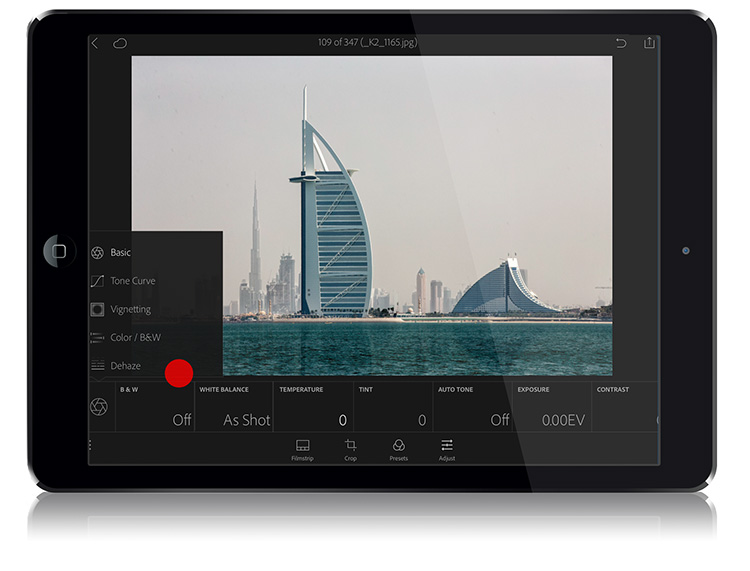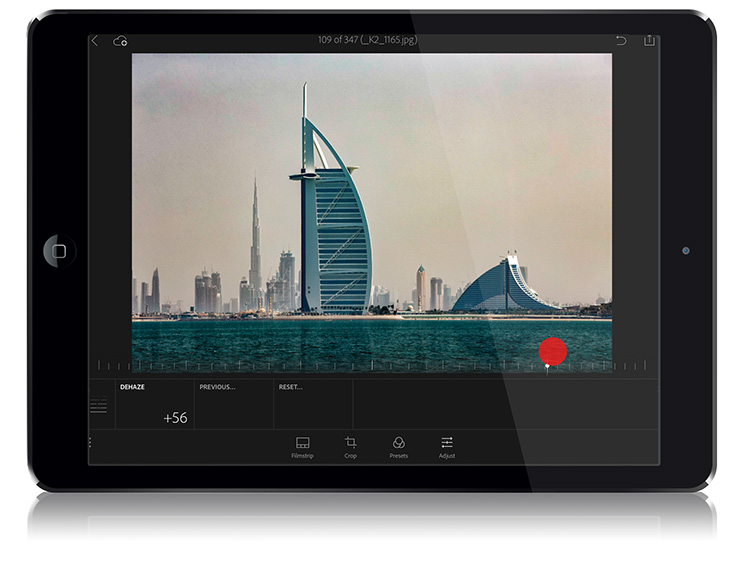Welcome to Lightroom Mobile Week
Hi Gang: This week we’ll be focusing on the new features Adobe has added to Lightroom Mobile in the latest update, and there’s some really good stuff in there. I’m going to cover each feature individually this week, but before we get to our first feature (in just a moment), Adobe made a great change to their policy on who gets Lightoom, and I think that’s very important to cover first.
Lightroom mobile is now for everybody!
Previously, you had to be a Creative Cloud subscriber to be able to use Lightroom Mobile, but when Adobe released this latest update, they also announced that now anybody can download and use Lightroom Mobile for free for editing their mobile images. However, if you’re not a CC subscriber, you don’t get to sync with Lightroom desktop — you can only use it for editing images already on your mobile device — not sent over, or sync’d from Lightroom, which is a very important distinction, because in this non-subscriber mode it becomes a stand-alone mobile editor like the rest of the mobile editing Apps out there. So, even if you’re not on the CC plan, you can at least editing your mobile- images using Lightroom Mobile, and that’s a good thing.
Dehaze makes it’s way to LR Mobile on IOS
It’s one of the most-loved new features to come to Lightroom in years, and now it’s in Lightroom Mobile for the iPhone and iPad (Android updates listed below).
Go to the Adjust section —then tap once on the lens icon at the far left and bring up a pop-up list of additional adjustments, and at the bottom of the list you’ll see the new Dehaze.
This works pretty much like the Dehaze in Lightroom CC (before they added it to the Adjustment Brush), where it’s a simple slider — tap once in the Dehaze tile to bring up the on-screen slider. Dragging it to the right reduces haze (as seen here); dragging it to the left makes things look foggy. Pretty straightforward and it works pretty darn well in most cases (here I don’t like what it did to the sky, but that’s only because I had already applied it once in Lightroom CC, so applying it again here over did it).
NOTE: The Android version of Lightroom Mobile received three new features in this update, all of which were already in the IOS version. They are the Tone Curve; the Vignette effect, and the HSL/Color adjustments.
Ok, that eases us into “Lightroom Mobile Week” here at LightroomKillerTips.
Here’s wishing you a great start to your week.
Best,
-Scott
P.S. I’m in the Detroit area with my full-day seminar this week on Wednesday. Come out and spend the day with me if you can. 🙂





Hi guys
How to using libs Dehaze for My App Android and iOS
I create app using dehaze .How to using libs Dehaze of LigthRoom for mobile
Lightroom Mobile is completely missing a critical function: sharpening. Sharpening is not a “like to have” feature; it is “must have.” Its absence is a real deal breaker for serious mobile-platform-based digital photography. I really couldn’t believe it when I learned that there are no sharpening tools *at all* in this software. What the heck are you playing at, here, Adobe?
I’m not a CC subscriber but downloaded the ‘free’ app for android. Installed and asked me to create an adobe account. Not a problem. Now I get an email saying that it’s only a 30 day trial unless I sign up for a CC plan. Cold day in hell before I subscribe to anything.
Adobe may have announced that anyone can download and use lightroom mobile for free, but the android play store version still says it requires a subscription.
Hi Scott ,
Great idea to focus on lightroom mobile, one big functionality really missing is the sync from JPEG development settings back to Raw. The laptop based workflow with mobile “extension” = import on LR laptop & work on the run on ipad works just fine . But what would be really handy would be a a “mobile started DSLR ” workflow (not iphone) with
– importing small JPEGs from Camera (have a D800 so no way to import 36MB raw)
– followed by a basic editing of these JPEGs…and when back home
– importing all RAWs, and after that
– LR magic kicks in synchronizing the JPEG edits to the raw file with the same names in LR catalog
That would be a real mobile workflow … Any chance this is discussed at adobe HQ ?
Regards & thanks for all your great work & inspiration
Bjoern
This is a great idea! I think the road block would be editing a JPEG is very different than editing a RAW photo (if they were the same, nobody would shoot RAW, right?). For example, JPEG files clip way before RAW files, and JPEG files already have sharpening and contrast and noise reduction added, so you’re working on a file that already has adjustment on it, and it will look very different from the RAW original. You’d almost need a “JPEG RAW” file type that would send over a JPEG image, but without any of the JPEG corrections like sharpening, contrast etc., added in camera, so it would have to be a new type of JPEG file without “the sauce.” So, it wouldn’t be in Adobe’s court – it would have to be done by a camera manufacturer first – then Adobe’s job would be easy, but I think we’re a LONG way from a camera manufacturer offering us an untouched JPEG image, but hey – ya never know. I like the idea either way. 🙂
Hi Scott,
Glad you like the idea and actually it can be done 80 % already with an external plug in, a but “native” LR support would be much more comfortable .
There is a great PlugIn called ” Syncomatic” by John Beardsworth ( http://www.photographers-toolbox.com/products/jbeardsworth/syncomatic/)
which synchronizes Library metadata and Develop adjustments
– between pairs of files whose names are identical (or have a suffix like -edit)
– between pairs of files whose capture times are identical – new in Syncomatic 2.0
Allowing you to “travel and if you shoot raw+JPEG you can import the JPEGs into Lightroom Mobile, apply star ratings and flags, even make adjustments. When you return to your computer, you can import the raw files into Lightroom and LrM automatically imports the JPEGs with the metadata. Syncomatic’s capture time option allows you to sync the metadata from the JPEGs to the raw files.”
Pretty clever & it works like a charm !!!
I always shoot RAW (on CF) & JPEG (on Eyefi SD card) basic on my 2 cards in D800, import JPEG into LR mobile via EyeFi Wifi (so again small file size come in handy), make “basic” edits & selection & key wording on ipad , import the raws at home , let Syncomatic sync JPEG settings to RAW & finally delete all JPEGs.
This is a great way to use LR & mobile within given file size restrictions.
For your JPEG quality comment .. I use on my D800 a custom neutral “looks like raw” JPEG setting , so an edit comes 80% close to RAW with the final edit anyway done on the “big screen” . My goal is not 100% of the edit on LR mobile . But preparing 1000 photos to a 80% edit before I come home including a pre selection in keepers so that the home edit starts on the 300 pre-selected and 80% ready files .
Makes sense ?
Bjoern